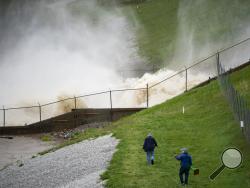TRAVERSE CITY, Mich. (AP) — A hydroelectric dam that failed to hold back floodwaters this week in Michigan was the target of lengthy investigations by federal regulators, who revoked the facility's license over safety violations two years before the flooding that forced 10,000 people to evacuate their homes.
Boyce Hydro Power’s history of violations lasted throughout the 14 years the company was authorized to run the nearly century-old Edenville dam, according to the Federal Energy Regulatory Commission, which said it repeatedly raised concerns about the dam's ability to prevent flooding during extreme conditions because of its inadequate spillway capacity.
The dam on the Tobacco and Tittabawassee rivers, about 140 miles (225 kilometers) north of Detroit, was among several barriers overtaken Tuesday by floodwaters that chased people from communities in central Michigan. Gov. Gretchen Whitmer warned that Dow Chemical Co.’s hometown of Midland could end up under 9 feet of water. She said the state will investigate the dam operators.
The commission ordered Boyce Hydro to form an independent team to investigate three other dams it owns on the rivers that were vulnerable to a “cascading failure scenario.” Among them was the Sanford Dam, which also was damaged.
The commission planned to send a staff engineer to the site to assist with the investigation as soon as it could be done safely, Chairman Neil Chatterjee said in a statement.
The governor said the state was “reviewing every possible legal recourse."
Lee Mueller, architect and co-member manager of the company, did not return calls for comment Wednesday from The Associated Press.
The Edenville dam, in Michigan’s Gladwin and Midland counties, includes a series of earthen embankments totaling about 6,600 feet (2,012 meters) long, with a maximum height of nearly 55 feet (16.8 meters). It forms a 2,600-acre reservoir known as Wixom Lake, a popular boating and fishing spot.
The dam has two reinforced concrete spillways to carry away excess water when reservoir levels get too high.
In its 2018 order revoking Boyce Hydro's license, the commission said its primary concern about the dam was its inability to handle “the probable maximum flood” — the type of event that could be expected from “the most severe combination of critical meteorologic and hydrologic conditions that is reasonably possible” in the area.
Commission guidelines require that dams be able to withstand such a flood or have enough spillway capacity to prevent reservoirs from rising dangerously high. The Edenville dam's spillway capacity was only about 50 percent of the probable maximum flood, the commission said.
Inadequate spillway capacity is a common problem for U.S. dams, an Associated Press investigation found in 2019.
The commission said it warned the dam's previous owners of the need for improvements in early 1999, but no changes were made before the license was transferred to Boyce Hydro in 2004.
Boyce Hydro said it planned to build an auxiliary spillway on the Tittabawassee River that year and was studying the need for another on the Tobacco River, the commission said.
But the company failed to complete either project, repeatedly seeking extensions and missing deadlines, the agency said. Among its other violations: performing unauthorized dam repairs and earth-moving and failing to file an adequate public safety plan, maintain recreation facilities or monitor water quality.
For more than a decade, Boyce Hydro "knowingly and willfully refused to comply with major aspects of its license ... with the result that public safety has been put at risk, and the public has been denied the benefits, particularly project recreation, to which it is entitled," the commission's order said.
“The record demonstrates that there is no reason to believe that Boyce Hydro will come into compliance," the commission added. The company “has displayed a history of obfuscation and outright disregard of its obligations.”
The company twice lowered Wixom Lake's level without permission after the federal license was revoked, said Nick Assendelft, spokesman for the Michigan Department of Environment, Great Lakes and Energy, which has overseen the Edenville barrier since its federal license was withdrawn.
The department was pursuing enforcement action for the violation and resulting damage to natural resources when the dam gave way, Assendelft said. A lawsuit filed April 30 says the lengthy drawdowns in 2018 and 2019 killed “thousands, if not millions” of freshwater mussels, many listed as endangered species.
The Four Lakes Task Force, an authority formed by the two counties and area property owners, agreed to buy all four dams on the rivers from Boyce Hydro last December and was planning to close the deal within the next couple of months, spokeswoman Stacey Trapani said.
The group planned to raise $32 million for the purchase and for major upgrades and maintenance, she said.
Now, the status of the deal is unclear.
“We're still in emergency mode at the moment,” Trapani said. “As soon as we are able, we’ll start assessments so we can determine a path forward.”
___
Associated Press Writer Mike Casey in Concord, New Hampshire, contributed to this report.

